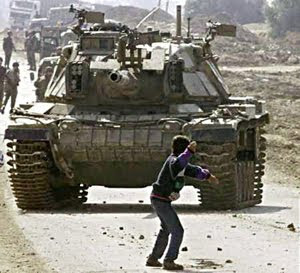Monday, June 7, 2010
What happened to us is happening in Gaza
OPINION/EDITORIAL
Iara Lee, The Electronic Intifada, 6 June 2010
At least nine of my fellow passengers were killed by the Israeli military for attempting to defy the ban on delivering aid. Far more Palestinian civilians have died as a result of the siege itself. What happened to our Flotilla is happening to the people of Gaza on a daily basis. It will not stop until international law is applied to all countries, Israel included.
In the predawn hours of 31 May, I was aboard the Turkish ship Mavi Marmara, part of a convoy of humanitarian vessels aiming to deliver aid to besieged civilians in Gaza, when we were attacked in international waters by a unit of Israeli commandos.
Our ship had been inspected by customs agents in Turkey, a NATO member, who confirmed that there were no guns or any such weapons aboard. Indeed, the Israeli government has produced no such arms. What was aboard the ship were hundreds of civilian passengers, representatives of dozens of countries, who had planned to deliver the Flotilla's much-needed humanitarian materials for the Gazan people. These Palestinians have suffered under an illegal siege -- first imposed by Israel in 2005 and strictly enforced since early 2009 -- which Amnesty International has called "a flagrant violation of international law."
The passengers on our ship -- including elected officials, diplomats, media professionals and human rights workers -- joined the Flotilla as an act of peaceful protest. Israel's powerful navy could have easily approached our boat and boarded it in broad daylight or pursued nonviolent options for disabling our vessel. Instead, the Israeli military launched a nighttime assault with heavily armed commandos. Under attack, some passengers skirmished with the boarding soldiers using broomsticks and other items at hand. The commandos and navy soldiers shot and killed at least nine civilians and seriously injured dozens more. Others are still missing. The final death toll has yet to be determined.
I feared for the lives of my fellow passengers as I heard shots being fired on deck, and I later saw the bodies of several people killed being carried inside. I had expected soldiers to shoot in the air or aim at people's legs, but instead I saw the bodies of people who appeared to have been shot multiple times in the head or chest.
When it was over, the Israeli soldiers commandeered our ships, illegally kidnapped us from international waters, towed us to the port of Ashdod, and arrested all of us on board.
The Israeli government has confiscated all of our video equipment, hard drives with video footage, cell phones and notebooks. They detained the journalists aboard my ship, preventing them for days from speaking about what happened. Acting on Israel's behalf at the UN Security Council, the United States has attempted to block a full, impartial, international investigation of the incident.
Nevertheless, even at this early stage the world has expressed outrage around a basic fact: There is no justification for launching a deadly commando attack in the dark of night on a humanitarian-aid convoy.
The Israeli government denies that its punitive blockade of Gaza is the source of hardship for civilians there. While its spokespeople actively work to create confusion in the media, the truth is clear for all who would care to see it. The overwhelming conclusion of highly respected human rights authorities is that the Israeli government, because it does not accept the legitimacy of the elected Hamas government, is pursuing a policy of what Human Rights Watch calls "collective punishment against the civilian population," illegal under international law.
With regard to the Flotilla I was on, the Israeli government says it would have permitted our humanitarian aid to enter Gaza by land had we submitted it through "proper channels." But Israel's "proper channels" -- restrictive checkpoints that have repeatedly turned away World Health Organization medical supplies and rejected or delayed the delivery of UN food aid -- are the very source of the humanitarian crisis.
Israeli spokespeople insist that the Gaza Freedom Flotilla was a provocation. It was, in the sense that civil rights protesters in the American south who sat at segregated lunch counters represented a provocation to segregationists, or in the sense that all nonviolent protests against the illegitimate acts of a government are by definition provocations. Under an illegal siege, the delivery of aid to civilians is a prohibited act; the intent of our humanitarian convoy was to violate this unjust prohibition.
At least nine of my fellow passengers were killed by the Israeli military for attempting to defy the ban on delivering aid. Far more Palestinian civilians have died as a result of the siege itself. What happened to our Flotilla is happening to the people of Gaza on a daily basis. It will not stop until international law is applied to all countries, Israel included.
Iara Lee is a filmmaker and a co-founder of the San Francisco's Caipirinha Foundation. This article originally appeared in theSan Francisco Chronicle and is republished with permission.
Subscribe to:
Post Comments (Atom)
Text Widget
/


No comments:
Post a Comment